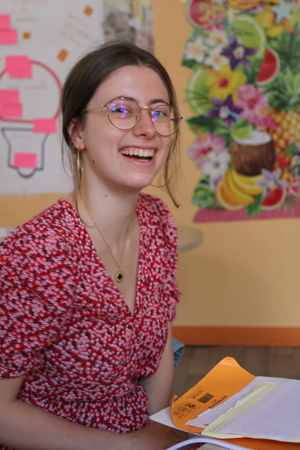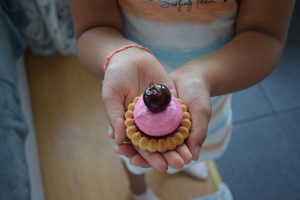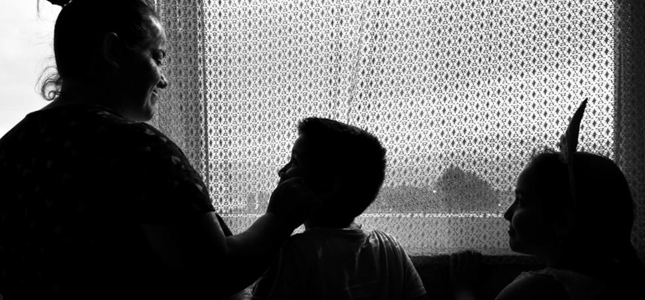With two little children and her husband, this young woman has experienced everything: the rejection of her father, repeated exile, being homeless, the joy of the first job (in black), the fear of the police. However, the Albanian cook insists with a smile “When things are not going well, I make a cake and after that it is a little better”.
By Suzie Holt, student at Science Politics, Nancy, France
Editor Elda Spaho Bleta
Translation in English and Albanian from the French original by Elda Spaho Bleta

Photo credit
Anastasia PAPADOPOULOS
In the photo above: Ornela and her children. Photo credit Anastasia PAPADOPOULOS
"I don't like asking people to help me. I was very disappointed..." Ornela* pronounces often this phrase to anyone who asks her why she goes on almost alone with her legal procedures in France. This 28-year-old young woman left Albania when she was barely of age and, for 10 years, she has traveled the roads of immigration while building her family life.
Ornela's childhood, in a small Albanian village, was marked by the authority of a father whom she describes as "fanatic" and who prevented her daughter from going to school when she reached the 13 years old. Later, her refusal to meet her future husband, for whom she had a real crush “we looked at each other and then, there you go! “, pushed Ornela and her spouse to hide to live their love story. First in Albania then much further afield…
The reason ? "My husband's family has been affected by a serious disease, for generations now. The hepatitis B. He inherited it from his mother and told me since we met. It is a disease that doesn't heal, it stays in your blood and you have to cure it for life. My dad, even my extended family, didn't want this "to come into our house", that his nephews and nieces could have it. He and they were adamantly against our relationship."
An almost mythical fear accompanies hepatitis B, according to which the disease is transmitted genetically because it passes easily from one family generation to the next. The same fear is perceived everywhere, not just in Ornela's family. "According to a preconceived idea, hepatitis B is 'hereditary', since several generations of the same family can be affected by the disease", - declares "Hepatitis B Foundation" in its official page www.hepb.org1.
A useless fear because, "however, hepatitis B is not a genetic disease: it is caused by a virus which is often transmitted between members of the same family, at birth from mother to child, or by blood, accidentally. Families have the power to break this vicious cycle by getting tested, vaccinated, and treated”1. And that's what Ornela did: pregnant, she had many medical visits to prevent and control the transmission of hepatitis B. With success; none of their children had it.
A love story, but not only
They got married at the age of 18, a few months before the birth of their son. Traveling from Albanian city to Albanian city, from village to village, she underlines a permanent instability which is for her “very difficult” economically and emotionally. The newly created family has no stable resources, home or real family ties in Albania which pushes them to leave the country in 2015. "My family, even distant cousins, harassed my husband everywhere because of our marriage. Life became very difficult for him. For both of us. We used to change places because of this hostile atmosphere, but Albania is such a small country. And on top of that, the continuous displacements have made our economic situation very difficult", - she says.
So here they are, leaving the country in 2015, still determined to live their life as a couple.
When they arrive in Hamburg, Germany, the couple have a two-week-old baby girl and a one-and-a-half-year-old son. It is the fear they feel first and the loneliness when at the airport, they only hear German or English around them. Two languages they don't know... However, they are not totally alone since in 2015 Germany experienced a wave of immigration from different countries, including Albania. Thus, Ornela and her family are part of the 1.1 million migrants that the German government recorded that year. They lived in a house for a year before leaving, for fear of being deported. They had not been regularized...
After spending a year in Albania, it was in France, in Nancy, that the family decided to settle down in 2017.
They found some stability when they were housed in the Faron barracks, a former military barrack, near Nancy now dedicated to housing asylum seekers. While the family once again has a roof over their heads, living conditions in Faron, according to Ornela, are far from optimal. “We asked for asylum. We were first placed for 3 months in the Faron barracks. There were dozens of us living together in a tent. There were no beds, we slept on deckchairs. And there were cockroaches, bedbugs... My son got bitten a lot and they didn't want to take him to the hospital because "you don't have health insurance yet ". Then they put us in a CADA residence (Reception Center for Asylum Seekers). After 7-8 months, our asylum application was rejected, so all four of us had to leave the center. I had made a friend during our stay at the Faron barracks. She was luckier than us and she had been put into an apartment. She hosted us for two months. But we couldn't stay there longer, it was too much to ask. So, we thought about changing town, maybe in another they could offer us shelter. We went to Rennes".

They are 4 in the street
In this big city, they didn't know anyone for the moment. The doors of the institutions they knocked on were soon closed to their face. Always this "no" as an answer. Now it was time for the streets… where they lived for two whole months. With their babies, their fears. And their hopes.
" It was terrible. I was very scared. At night, we watched for the children so we could not sleep". These are words that sum up 2 months of Ornela's life, which she spent on the road with her husband and their two young children. She evokes this period as a very painful memory marked by fear and permanent insecurity and, once again, by a great loneliness. "Nobody was helping us." It is loneliness that punctuates the story of Ornela's immigration and never leaves it, like a 5th member of her family. No calm is granted to the young couple: during the day, they search for a place where to sleep at night. And once night came, they watched for the children, so they do not sleep at all. Like a vicious circle filled with loneliness and instability...
Finally, after two months of being homeless, her husband finds a friend who lives in Nancy and who offers them shelter in his modest house. They live there for another two months. Still undocumented, unemployed. The situation is desperate, and the couple is ready to return to Albania, knowing full well that the harassment from their family would be again there, too high, and that the job opportunities would be too low. Only despair and misery in their fragile horizon. They are alone without the help of any social worker and survive thanks to the little money that the father of the husband sent them. Furthermore, now that the asylum's procedures are over, they live with a new insecurity; that of being found by the police and being deported... After 2 months spent in this permanent fear, another important reason is added and provokes their return to Albania: It was the father of Ornela's husband. He was suffering from a serious illness.
Back to Albania
So, the final decision was made, and it was in November 2018 that the family returned to their native country. Ornela's children remember this time and tell me about the animals their grandfather owned. The girl even recalls a memory of a traditional feast: a braided bracelet of red and white threads that adorns the wrists of young girls when the Dita e Verës comes, a celebration of the return of spring every March 14 in Albania. A week after this date, the bracelets are hung on trees or rosebushes so that the birds, especially the swallows, take them away.
However, this return to the source is not only marked by the positive and the festivities but by the categorical refusal of Ornela's father to see or speak to her again.
"She didn't listen to me before the wedding. Now that she is in the middle of the problems, let her solve them alone, with that husband she has chosen".
"I don't understand because I love him very much and he..." (she cries). They then lived in Tirana, the capital of Albania, but had to change city because it was too big for them and couldn't find any job. They are still not accepted by her family, still very poor. Without any hope of employment. “When we came back to Albania, it was at the end of 2018. We stayed in our country for a year and 4 months. None of the two of us didn't find a job and our children were growing up. We tried everything, but with no results. So, in March 2020, we came back to France".
With two little children and her husband, this young woman has experienced everything: the rejection of her father, repeated exile, being homeless, the joy of the first job (in black), the fear of the police. However, the Albanian cook insists with a smile “When things are not going well, I make a cake and after that it is a little better”.
France, once again...
It is in Nancy that the family established since March 2020, a few days before the start of the first confinement in France, following the Covid-19 pandemic. The same pattern as in 2017 is repeated since they must first live 7 months in the Faron barracks, still in the same difficult and unsanitary conditions. When they left the barracks, that was not synonymous with liberation; Ornela and her family lived for nearly a year and a half in a center for asylum seekers. Although it looks like a vacation, this life is very far from being in rest, given the everyday “staff checks. And I am still shocked by the treatment in this center; the file we had prepared for the Health Insurance was dragging. As an asylum seeker in France, we were able to have health coverage only ten months later. Their social worker, who was supposed to accompany us, did not even give us on time the post office's notice about the official answer regarding our asylum demand. She gave them to us weeks later, so when we went to the post office, the letters were gone. We assume that this was the negative response from OFPRA (French Office for the Protection of Refugees and Stateless Persons). We have thus twice missed the possibility of an appeal before the National Court of Asylum Law (CNDA) in Paris. So, we didn't even appeal the decision. How could we do it without the formal decision? At the center, they just told us that our asylum application was rejected and that the four of us had to leave. Even though we never had those formal decisions in front of our eyes, in our hands. Our children were very young, but we had to leave in November 2021 because we didn't want the police to force us out. This whole situation shocked my trust in others enormously and left me very weak", - recalls Ornela.
Independent, but “in black”
Since November 2021, the family has been able to find independently a small one-bedroom apartment. Ornela emphasizes the marked improvement in their accommodation: "It's quieter than in a hotel, clean, there are no insects". All the housing-related problems therefore seem to have disappeared, although there is one detail that she underlines: “it’s a bit small for four”. Even though the whole family has only one bedroom to sleep in, this tiny apartment is the closest definition of an "at us" than any other place they've been living in for the past ten years. Now, the children can go to school, participate in sports activities and they are well integrated. They will even go to a holiday camp and are delighted about it. As for Ornela and her husband, they were both able to find work in February-March 2022. In black, of course because they are still not regularized in France. She works for a restaurateur and he for a Turkish construction employer. For Ornela, working in a restaurant seems almost self-evident because she considers the kitchen as a real therapy and a shared meal as a real moment of conviviality: "When things are not going well, I make a cake and then it's a little better”, - she laughs. Both spouses therefore show a real desire to work honestly, an activity they enjoy although it is practiced illegally. Regarding the regularization documents, it is possible that Ornela obtains later a promise of employment from her employer. He is very happy with her work, but he hesitates because employers are often reluctant to face this kind of very complicated procedure. Anyway, she does not seem to know more about these procedures because she can't find much available information. “The lack of understandable information, simple to understand, easy to access, is a huge problem for us foreigners in France. This really prevents us from knowing the administrative procedures to better integrate here”.
Difficult, yes. But the family is determined to build a real future in France, by working and learning. And, once the job promise is made, Ornela will ask Secours Catholique Caritas for help. Their “Migrants” team has already offered help to compile a file to present to the prefecture.
It is thanks to this desire for integration that Ornela and her family are making progress little by little. They pay their own bills, without outside help, thanks to the salary they earn by working every day. Ornela wants to give her children a better life and is ready to sacrifice herself. "If I don't have anything for me, it doesn't matter. They are the most important." And then, they smile. A lot. Not once do we see Ornela sad. She smiles. Her children and her husband too. Despite the many difficulties they already have or will encounter, all the four of them smile and, what should be remembered from this family, beyond its perilous fight, is a highly developed sense of hospitality. And if you wonder where this warm light comes from, don't forget that the name "Ornela" means "sun's brilliance".
*The name of the person has been change in order to protect the identity.
References:
1 Hepatitis B foundation. Informations générales.Qu’est-ce que l’hépatite B ?
https://www.hepb.org/languages/french/general-information/
This article is produced as part of the “Coming together, telling stories, getting mobilized” project, a partnership between the PRO IDE information platform and the Secours Catholique Caritas Hauts de Lorraine, with the financial support of the latter. It was written by Suzie Holt, student at Political Sciences university Paris, campus of Nancy, volunteer (2022) with Secours Catholique Caritas Hauts de Lorraine, and edited by Elda Spaho Bleta, journalist, founder of PRO IDE. The sources of the information are quoted, and when a personal opinion is given, it engages only the author. The content of the articles does not engage the previously named structures.

